Denmark’s capital city and its steadily-expanding Bella Center was last the venue for EuroFinance’s international treasury management conference in 2015 and was selected once more this year. As Graham Buck reports, geopolitics, Brexit uncertainty, the ripples caused by Facebook’s plans for its own cryptocurrency and even the art of political cartooning were as high on the agenda as the more traditional concerns of corporate treasury and the possibilities that are being opened up by new technology
Please use the navigation tabs below to read the reports for each of the three days.
Friday, 1st October
Treasury transformation for growth companies
Wieland is at the heart of the major trends shaping the world today: recycling, urbanisation, globalisation and digitisation. The €5bn group is a copper and copper alloy specialist with a broad product and service portfolio that provides its customers with solutions for automotive, electronics, refrigeration, air conditioning, electromobility, connectivity and electrical equipment.
In this session, Wieland will profile its treasury function and how significant growth via M&A in North America led to a diverse cash management structure with multiple banks and different processes that demanded a consolidation in order to leverage efficiencies. The consolidation project reduced the number of its banks and onboarded SAP and SWIFT.
The successful North American roll-out was based on experiences of smaller roll-outs in Europe and further regions are already scheduled. This session will look at those transformations.
Speakers:
- Fabian Schwarz, Director Treasury & Corporate Finance / AR, Wieland Group
- Katrin Steinbach, Team Leader Global IT Finance & HR, Wieland Group
Resilience in the face of stress
Geopolitical challenges took precedence over more day-to-day treasury issues on the first day of this year’s EuroFinance international treasury management conference in Denmark’s capital city
With climate change protestors regularly taking to the streets this year, EuroFinance’s decision to return to Copenhagen for this year’s international treasury management conference was well-timed; probably even more so than the events group could have guessed.
This summer, the Danish capital’s new climate plan, CPH 2025, was published outlining its aim to become the world’s first carbon neutral major city within six years; a target that its mayor, Frank Jensen describes as ambitious but achievable.
The conference venue, the Bella Center is Scandinavia’s second largest exhibition hall and the various sustainability initiatives under its declared policy of “responsible hospitality” includes minimising energy consumption.
Now in its 28th year, EuroFinance 2019 attracted more than 2,200 delegates to Copenhagen, which managing director Asif Chaudhury reported as a record number. In keeping with the heightened concerns over global warming, together with growing geopolitical tensions, this year’s overall theme was resilience, with the focus for Day One of the conference on “resilience in the face of stress”, which also featured prominently at Sibos London presentations last month.
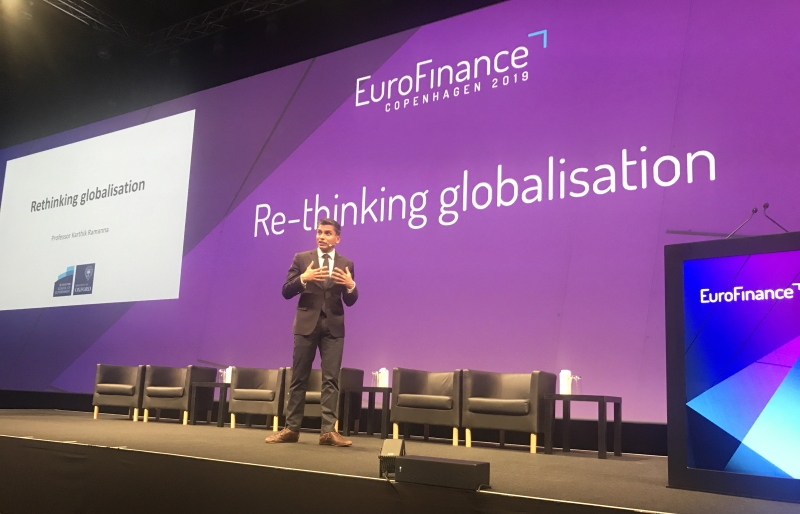
Professor Karthik Ramanna
The opening plenary session considered the question of whether it is time to rethink globalisation. Karthik Ramanna, professor of business and public policy at the University of Oxford’s Blavatnik School of Government suggested that the narrative had changed since the global financial crisis, with the rate of change accelerating in the past five years.
He said that the basic aim of globalisation was the integration of local economies into a worldwide free market economy, which conventional wisdom holds as achieving three basic goals:
- The consumer benefits from lower prices;
- Bringing people together fosters the creation of new ideas and new technologies; and
- Integration makes the world a smaller, but safer place by mitigating the threat of war
Mind the gap
However, post-crisis “the narrative has changed” and increasingly associates globalisation with jobs being lost, monolithic companies becoming dominant and the destruction of local cultures and communities – a fear that populist leaders have been quick to exploit. According to Ramanna, popular discontent in both rich and developing countries has been further fuelled by a widening wage gap since the start of the 1980s between highly skilled workers and the low-skilled, with the latter seeing their remuneration levels stagnate or even decline.
Advances in technology explain the increased premium placed on skills, he noted, but a widening skills gap reflects increased globalisation, which has driven the pace of technological change.
How can businesses respond to this more volatile geopolitical environment? He suggested seven basic rules:
- Don’t ignore the problem
- But don’t become too activist either – corporates “shouldn’t bite off more than they can chew”
- Your company’s ‘asymmetric capability’ in a market matters, so if you’re a market leader you should never take your cue from a smaller competitor
- The legitimate expectations of your company differ across markets – as an example a South Korean company who set up in San Francisco and developed a diverse workforce there found that attempting to relocate some of those workers to Seoul, where a far more conservative culture prevailed, created huge disruption. So what works in one market won’t necessarily work elsewhere
- Avoid politics, particularly away from your ‘home turf’. “there is no upside from taking sides in a divided political landscape,” says Ramanna
- Work collectively when setting the rules and when communicating them, to mitigate the risk of being regarded as self-serving
- Remember that while actions matter, so do perceptions
Asked if corporates could remain neutral on the issue of climate change, Ramanna observed that scientific consensus is widely accepted in Europe; less so in the US where a clash of cultures is more evident. So while it is important for an organisation to develop a policy in response to climate change, those in Europe “have the regulatory winds behind them” and can declare their policy with greater confidence.

Kristina Libby – EVP of future science and research at Hypergiant Industries
Technology tipping point
What technology trends can corporate treasury expect in the first half of the 2020s? Kristina Libby, EVP of future science and research at Texas-based defence and artificial intelligence (AI) tech developer Hypergiant Industries, believes that it will largely continue to build on those trends of the past five years with more blockchain applications, the further development of 5G tech to accelerate the speed of connectivity, cybersecurity risk that includes a growing incidence of nation state attacks, and an increase in augmented and virtual reality (AR/VR) applications.
Libby’s plenary session, titled “Technology stressors: over the technology tipping point” began by suggesting that fears we risk a “technological dystopia” can easily become unfounded if we ask ourselves what sort of future we wish to create.
Treasurers should be clear why their company is undertaking a digital transformation programme and specifically identify the systems that are potential candidates for AI solutions. “Top down direction and support, both from the CEO and at board level,” she stressed as important, adding that 84% of digital transformation programmes that fail do so due to lack of executive support.
Additionally, many digital transformations incorporate AI, which can quickly solve problems and find solutions although not always in ways that people understand.
“Employees have to be aligned with the vision,” added Libby. This means providing both education and reassurance that their job isn’t under threat, although its specification could change.
A panel session moderated by PwC Switzerland partner Sebastian di Paolo followed on the seemingly uncontentious issue of “treasury ‘must-haves’ versus ‘nice-to-haves’” with Cuan Duncan, head of treasury and corporate finance, at Dubai-based privately-held group Al-Futtaim; Regina Ochev, VP and assistant treasurer for industrial real estate group Prologis; and Naomi Holland, assistant treasurer for Intel Corporation, Ireland. The broad issues discussed by the panel included the recent impact on companies that have transferred manufacturing activities from China in response to trade tensions and also the bankruptcy of key suppliers, the growing challenge of financial crime and increasingly sophisticated fraudsters and the need for companies to establish a clear environmental, social and governance (ESG) policy in response to pressure from investors and other stakeholders.
When the going gets tough
The final plenary session of the morning, titled “Staying positive: smart growth strategies for tough times” began with an audience poll, with delegates asked to state which of three statements they agreed with. The result was as follows:
Treasury is a growth enabler 62%
Treasury supports growth 30%
Treasury drives growth 8%
For Philip Maton, VP treasury and head of risk at telecommunications group Liberty Global UK, the treasurer’s duty is always to assess the potential downside for his or her company, asking what could go wrong and how to either avoid or mitigate the impact.
So a successful hedging strategy has to address what happens in tough times and prepare for them in advance if growth is to be maintained as “otherwise you’ll be occupied with fighting fires”.
In the current environment of zero and negative interest rates, treasury needs to know the company’s risk tolerance and reflect it in an investment policy that achieves the required balance between high yield and safe but low return.
Douglas Tropp, corporate treasurer of Booking Holdings, explained that the company is unusual in operating under a number of brand names that are kept completely separate from one another – to the extent that there can sometimes be competition between them.

Douglas Tropp of Booking Holdings
“Treasury has been completely decentralised so each of our brands has its own treasury staff, who report to the CEO of the brand who in turn reports to the company’s CEO,” he explained.
On joining the company, Tropp was told that this structure would not be changed, requiring him to go to each brand in turn, compile a risk profile and identify where the expertise was located.
“Over time, I worked with each treasury team on a one-to-one basis to establish trust, listen to and encourage ideas and decide what worked best. I now work closely with each team and ensure that I’m visible to them.”
Among the issues that Liberty Global has reviewed is the “right degree” of centralisation for the group’s treasury activities, which Maton admitted isn’t an easy task “particularly in a company that has been acquisitive”. However, he suggested that interaction with the capital markets, which requires specific expertise, is among those to benefit from centralisation.
A different roadmap
Afternoon sessions at EuroFinance divide into six separate streams, four more under the title ‘Discovery Lab’ and presentations on complex markets such as Brazil, India and Africa.
A Discovery Lab presentation, entitled “Tearing up the Treasury Roadmap”, was chaired by Birgita Gjirja, a director of law firm Zanders UK, who introduced a panel comprising Frances Hinden, VP of treasury operations for Shell UK; David Williams, group CFO for electronic invoicing specialist Tungsten Network; and Ireti Samuel-Ogbu, EMEA head of payments and receivables, treasury and trade solutions at Citi UK.
As Gjirja noted, treasury has “traditionally been a cautious adopter of novelty”, but this caution is not sustainable in the face of the new technologies transforming financial services and a resulting “landscape…with which treasurers will be unfamiliar”.
Samuel-Ogbu also suggested that only two years ago, a widely-held theory was that the tech revolution would see fintechs take over and make the banks redundant. This had changed to a recognition that collaboration between the two was preferable. “The banks bring scale, clients and trust; the fintechs provide innovation and agility,” she noted.
“There’s a ‘sweet spot’ where the two can meet and work together in addressing specific problems.” Williams suggested that supply chain finance was one example of this; its evolution meant it was no longer limited to only the biggest banks offering SCF and only a handful of companies using it.
Over the next five years, the panellists said they expect “smart treasury” to take AI, data insights and automation to the next level. A more hyper-connected world will include real-time payments collections and treasury management systems incorporate application programming interface (API) connectivity to the banks.
Dealing with data
The recently-published Economist Intelligence Unit (EIU) report “A Quantum Leap: Building a Data-Driven Treasury”, supported by Deutsche Bank, was the focus of an afternoon session presented by the report’s editor Melanie Noronha, senior editor, thought leadership, at the EIU. She opened the session by outlining the aim of the report: digitalisation offered treasury the opportunity for better decision-making, improved operational efficiencies and an enhanced return on investment, and corporate treasurers had reported back on how far along they were on the journey towards these goals.
“Unless you have data and use it to learn from past behaviour, you [the treasurer] won’t come to the decision makers’ table fully educated,” added Ole Matthiessen, Deutsche Bank’s head of cash management. He singled out cloud, AI and big data as the most valuable tools that new technology offered to treasury, with robotic process automation (RPA), blockchain technology and APIs as very useful but not quite in the same league for treasurers.

Ole Matthiessen of Deutsche Bank
Also offering their experiences of data-driven treasury were Vincent Almering, group treasurer of Dutch dairy trading group Interfood and Tomer Amitai, SVP, group treasurer and head of insurance and risk management for Teva Pharmaceutical Industries. According to Almering, while companies are swiftly developing their ability to use data to competitive advantage they are less convinced that “unstructured data lakes” offer much value – or rather that the next big step is actually to structure the data first.
Amitai reported that Teva has been focusing on treasury centralisation with a global view. As an increasingly high yield company, it was focusing on how best to leverage data and transform it into value-generating insights.
Both agreed that these new tasks involve “enlarging the pool and educating the team” by attracting suitably-qualified new staff and “upskilling” existing colleagues within treasury.
Hedging options and Porsches payment landscape
Another afternoon session, “To Hedge or not to Hedge?” saw presenter Marco Knauf, international treasury director for agricultural processes and food ingredients group Archer Daniels Midland, unable to travel to Copenhagen and instead provide his insights via audio link.
Knauf described hedging as something of a “bread-and-butter issue”, in which addressing FX risk rests on several basic considerations for treasury: Which risks do we focus on and which are the most important to manage?
What are the relevant economics of hedging?
How do we implement effective hedging strategies in real life?
For Archer Daniels, a group with 40,000 employees globally, the impact of Brexit, currency devaluations, trade wars and political turmoil must be regularly assessed and hedging “is just one of the potential options in treasury’s toolkit”. Its own policy is to protect its future cash flows by locking-in cash margins, a hedging option selected as the group is involved in major transactions and which requires its commercial operations to work in unison with treasury management.
The menu for the final afternoon sessions on Day One included tips on accelerating the payments process from carmaker Porsche, represented by Matthias Brantl, director transaction controlling and cash management, and Vivien Hasenjäger, the group’s cash management and payments specialist.
They recounted how a 2017 analysis of Porsche’s “payment landscape” found that it had a total of 50 bank relationships and 350 bank accounts. Treasury’s mission had been to transform this through transaction banking that could provide easily scalable solutions; e-payments and consumer-to-business (C2B) options; and payment innovation via new technologies.
A tender for the transformation project was won by cloud platform Treasury Intelligence Solutions (TIS), which is rolling out an e-banking solution to Porsche’s 140 entities in 24 countries via three stages. The first of these went live in early 2018, with subsidiaries in North America and China added this month and the third and final stage to follow before the end of 2020.
Hasenjäger reported that the group is already enjoying the benefits of automation, including greater transparency and flexibility across its treasury operations, higher efficiency and greater security.
And on this upbeat note, Day One of the 2019 conference concluded.
Resilience through collaboration
Providing a progress report on Brexit as the news changed by the hour proved a tough call to start the second day of this year’s EuroFinance international treasury management conference
Can presenting on a topical issue at EuroFinance’s international treasury conference be called “a poisoned chalice”? The answer is ‘yes’ when that topic is Brexit and you must address an audience of treasurers in Copenhagen just as the state of negotiations in Brussels is changing by the hour.
Brexit’s link to this year’s conference theme of resilience and the specific focus on Day Two of “resilience through collaboration” is tenuous, given that treasury departments have been encouraged to be prepared, yet detail on the timing and exact nature of the UK’s exit from the European Union has been absent until now.
Joan Hoey, regional director and Europe editor of The Democracy Index at the Economist Intelligence Unit (EIU) ruefully admitted the impossibility of her task at the outset and had to settle for predictions that could well be confounded within two days, at the emergency session of Parliament scheduled for ‘Super’ Saturday October 19. However, she believed there was a strong possibility that the UK’s departure date from the EU could be subject to a further short-term delay, this time of three months and a UK election before the end of this year with her personal prediction that the Conservatives secure a majority. (Editor’s note – this article also falls foul of the same timing dilemma and is written as at the time of the conference).
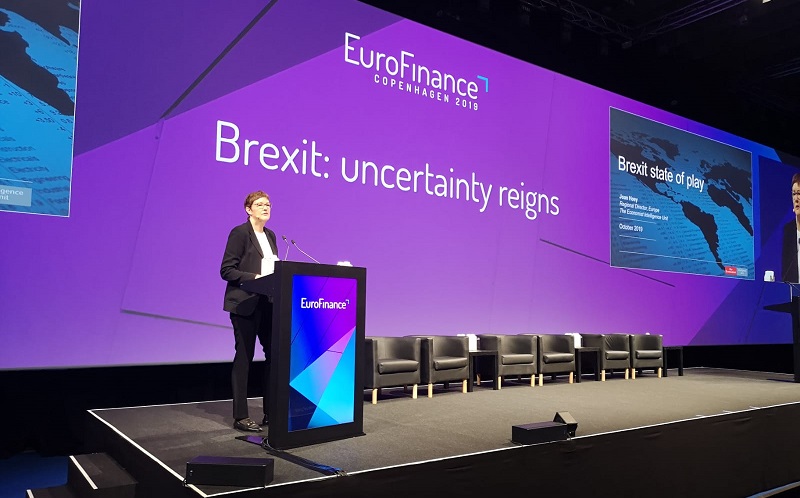
Joan Hoey of the EIU
In response to audience questions, Hoey also suggested that the prospects of a second referendum were slim as restaging the vote would be fraught with difficulties and that the recent surge of support for the Liberal Democrats would not be maintained in an upcoming election.
She outlined the main events since the June 2016 referendum and suggested that the economic cost of Brexit uncertainty had been substantial, but fell short of the catastrophe that many had predicted. Real GDP growth had softened and UK business investment had flagged, but UK employment had held up well and real wages showed growth. Nor was the depreciation of sterling necessarily unwelcome as the currency had been overvalued.
Nor does the EIU believe that London’s status as a financial centre will suffer lasting damage from Brexit.
“The core financial services industry is strong and well-prepared, even for a ‘no-deal’ scenario,” said Hoey. “The sector has had to adapt, certainly, but the UK is unlikely to lose its pre-eminence as a financial hub.”
More concerning was the evidence that while popular support in France and Germany for following the UK’s exit from the EU had waned, public discontent across Europe against the established political system had intensified. There was a widespread feeling among voters that the established political parties no longer represented them and the resulting resentment had resulted in protest movements such as France’s ‘Gilets Jaunes’.
What can corporate treasurers expect in the post-Brexit era? Hoey believes that UK corporates that derive a high proportion of their revenue overseas and are not too heavily invested in sterling will be among the beneficiaries, but companies in the retail and travel sectors will be hardest hit. Inward immigration to the UK is likely to remain at fairly high levels and talk of the country becoming “Singapore on the Thames” had certain validity as there was still scope for further deregulation.
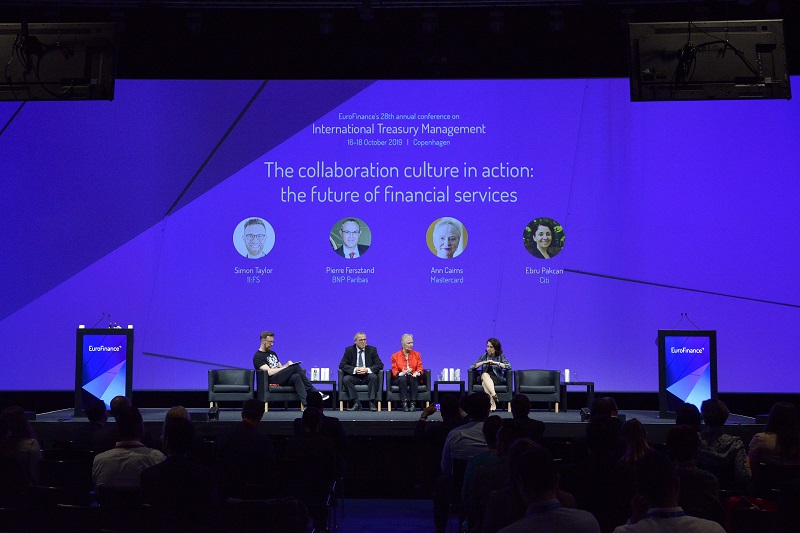
Simon Taylor, co-founder and director of Blockchain at 11.FS moderating the panel
Libra as a game changer
An even more recent news event was analysed in the next session by co-founder and director of Blockchain at 11.FS, Simon Taylor, who focused on the announcement by Facebook on 18 June this year that it planned to launch its own cryptocurrency, Libra, in mid-2020 with the support of 27 founding corporate members. Treasurers want to know whether their company and their customers will ever use Libra, and whether it could affect both their liquidity and that of the global economy, he said.
Taylor suggested that Facebook’s motives for the planned new currency were several and included flat advertising revenue and a recent reliance on acquisitions for its recent growth. It also faced growing competition from the East thanks to Alipay and WeChat, which were now making inroads into Europe.
Not everyone welcomes the prospect of this proposed new global digital currency. Indeed France’s economy and finance minister, Bruno Le Maire, warned in a Financial Times article last week that Libra poses a threat to national sovereignty. According to Le Maire: “the project would mean a private company controlling a common good and taking over tasks normally discharged by states. This is unacceptable for both economic and political reasons.”
As Taylor noted, Facebook has so far “taken all the bullets” from such critics, although Libra currently has the backing of 21 organisations (six having bailed out since June) via the registered, not-for-profit Libra Association, headquartered in Geneva.
So far this entity “hasn’t yet spoken for itself”, but Facebook’s vice president of messaging products, David Marcus, has sought to give reassurances by saying that Libra’s ambitions are limited to being “a better payment network and system, running on top of existing currencies” and that it will be “backed 1:1 by a basket of strong currencies”. Facebook is the designer of the Calibra wallet that will hold Libra tokens, but Taylor expects the focus to move away from the social network “if it does its job right” and more to the new currency.
As to the question posed by the title of the session, ‘What if Libra Works?’, Taylor said that while France and Germany are hostile to the concept, both the Federal Reserve’s chief Jerome Powell and Bank of England governor Mark Carney are more open to it if regulatory concerns can be satisfied.
Meanwhile, JP Morgan is developing its own digital currency, JPM Coin, while the People’s Bank of China (PBOC) also has plans for its own central bank digital currency (CBDC) initiative.
“Whether or not Libra succeeds as it currently stands or evolves dramatically, it is forcing a conversation,” concluded Taylor. “It is time to pay attention to it.”
Pragmatic solutions
Taylor was also moderator for a panel session that followed titled ‘The collaboration culture in action: the future of financial services’, with Ann Cairns, executive vice chairman of Mastercard UK; Pierre Fersztand, global head of cash management, trade and payments for BNP Paribas; and Ebru Pakcan, EMEA head treasury and trade solutions at Citi UK.
Cairns said she looks forward to an “interesting future”, with the era of open banking in which the need for collaboration is accelerating and e-commerce is growing at an annual rate of 300%, against a geopolitical background of growing nationalism and an “America First” stance by the world’s largest economy. “We want a platform that takes the friction out of doing business, regardless of geopolitics,” she added.
Fersztand added that the route to achieving this was through a collaboration between banks and fintechs that could develop “pragmatic solutions” for the various pain points experienced by corporate treasury.
For many years electronic bank account management, aka eBAM, has been promoted as a panacea for various treasury pain points, but this is one solution that corporates have often been slow to adopt. When the conference schedule divided into various streams for the afternoon, the benefits of eBAM – and specifically its adoption by the power supplier E.On – was the focus for one of the opening sessions.
Jens Otto, E.On’s head of financial settlement, explained that the group had expanded to become one active in 15 countries and with a 70,000-strong workforce, following the recent completion of a €43bn asset swap that saw it acquire a majority stake in renewables business Innogy from RWE. This made it an opportune moment to move away from the paper-based process of traditional bank account management that have been further complicated by the introduction of the Know Your Customer (KYC) regime.
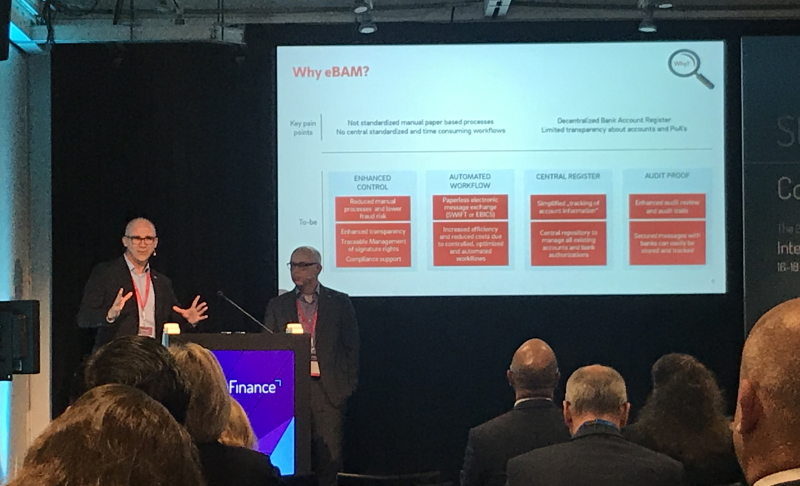
E.On's treasury team on the benefits of eBAM
eBAM to the rescue
“At the start of 2018, we declared there were too many ‘pain points’,” said Otto. “Our manual, paper-based processes were not standardised, and we had no central standardised workflows, which were time-consuming. Add to this a decentralised bank account register and limited transparency of our accounts and payments on accounts (PoAs).”
E.On opted to move to eBAM to gain four central benefits:
- Enhanced control, with fewer manual processes and a reduced risk of fraud
- Automated workflows and a paperless electronic message exchange via SWIFT or the Electronic Banking Internet Communication Standard (EBICS)
- Centralised Register, providing simplified tracking of account information
- Audit-proofing via an enhanced review and audit trail
However, preparing for the transition was a major undertaking. “We do business with as many as 20 banks, so had to collect together all the various data fields and information needed to set up electronic exchanges,” Otto revealed.
The benefits have justified the efforts though. Otto said that time is critical when treasury wishes to open a new bank account and this can now be accomplished within three days. An umbrella agreement between E.On and the bank is the sole remaining paper-based document; this allows for the inclusion of all subsidiaries only via digital PoAs and subsequent changes are electronic.
It has even enabled the tricky issue of KYC to be tackled and why it can prove a protracted process. “Banks respond that they don’t always get the information required, they don’t get it in the correct format or that they don’t always understand it,” said Otto. “eBAM at least means that there is a complete set of information on you system that you can exchange with the bank.”
Brave new world
Other afternoon sessions on Day Two included a technology showcase titled “The Brave New World of Trade Finance” and focused on how technologies such as blockchain are transforming the trade financing marketplace. The session allowed three companies the opportunity to promote their solutions: Joshua Cohen, MD of Mitigram; Arti Rao, MD of LiquidX; and Dave Sutter, chief strategy officer for the Marco Polo platform.
Stockholm-based Mitigram launched in 2015 as developer on an online platform for funding and hedging trade finance and aims to facilitate the communication between businesses, service providers and financial institutions just as KYC and tougher anti- money laundering (AML) requirements make the task tougher.
Marco Polo was formed two years by the TradeIX trade finance open platform together with a dozen financial institutions and the enterprise blockchain software consortium R3. As Sutter remarked: “Trade finance is an inherently decentralised business that requires decentralised technology” and by providing a distributed network that also allows each participant to retain control and custody of their data, Marco Polo has enjoyed rapid growth in its first two years of operation.
LiquidX’s focus is on providing a global network for illiquid assets or as Rao described it “assets that traditionally have been difficult to monetise”. He added that corporates are increasing using new working capital and risk solutions for various reasons that include increasing liquidity, reducing borrowing costs, improving sales terms, increasing ratios, for event-driven liquidity and as a risk navigation tool.
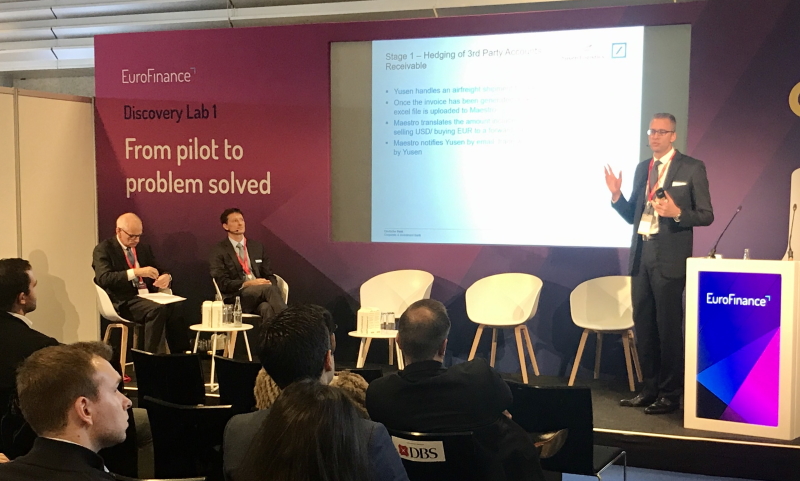
Yusen Logostic's adoption of RPA for FX risk management outlined
Another afternoon session under the Discovery Lab banner focused on the application of robotic process automation (RPA) for FX risk management and liquidity. Stefan Karenfort, general manager, finance and controlling for Yusen Logistics was joined by Xavier Szebrat, Deutsche Bank’s VP risk management solutions, to describe RPA is being applied to reduce FX risk and enhance liquidity management by integrating balance sheet hedging with cash management.
Dicing with debt
Day One having concluded on an upbeat note, Day Two offered a heavy black cloud with its reminder that the OECD reported in February that global corporate borrowing ended 2018 at no less than US$13 trillion, or more than double the level it stood at just before the 2008 global financial crisis. Of this total, around US$4 trillion must either be repaid or refinanced over the next three years.
A panel of five treasurers outlined their strategies for debt, interest rate risk management and balance sheet risk management: Christian Bauwens, SVP and treasurer of US electronics manufacturer Flex; Falguni Bagchi, director of treasury operations for Hertz UK; Paul Rekmans, head of corporate finance for Netherlands group Philips; Adam Richford, head of treasury and investor relations at waste management group Renewi; and Luca Pescatore, head of capital management for insurer Swiss Life.
Some glimmers of hope were provided by the protracted era of zero-to-negative interest rates, which as Pescatore noted has been particularly advantageous for Swiss companies that responded to regulation in 2010 by taking out longer tenors on their borrowing just as interest rates decreased. Bauwens noted that negative yields had yet to extend to the US but added “we’re expecting it in time.”
“The markets are currently very open with various options available, but 2008-09 proved just how quickly things can change.”
The panel agreed that investor awareness of ‘greener’ funding initiatives is steadily growing and Richford suggested it is becoming easier to quantify the benefits of green bonds versus non-green bonds as the former benefit from improved pricing and new investors emerging to fund sustainable projects.
The session was held a day after the International Monetary Fund added its own warning, assessing the level of corporate debt “above crisis levels” at nearly half as much again as the OECD estimate, at US$19 trillion. However, the US-China trade war and a global economic slowdown raise the prospect of rates staying “lower for longer.”
Resilience and identifying opportunity
As geopolitical stresses rise, can companies formulate strategy or should they focus on tactics? Treasury in an age of uncertainty was considered on the final day of this year’s EuroFinance international treasury management conference
It’s a reflection of how far geopolitics has intruded into corporate treasury’s considerations when EuroFinance delegates head home with their own hand-drawn caricature of Donald Trump.
The sketching session came towards the end of the 2019 international treasury conference in Copenhagen. The third and final day, with the overall theme of resilience focusing on “resilience helps to identify the right opportunities”, opened with a review of the political landscape by Charles Hecker, senior partner at global consultancy Control Risks UK.
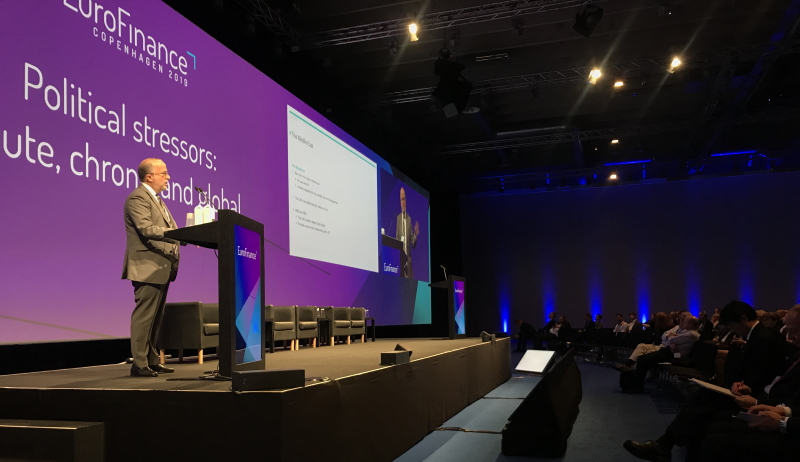
His presentation was titled “political stressors: acute, chronic and global” and Hecker suggested that the current political stance of the world’s two largest economies made it difficult for companies to formulate strategy. The US is currently “a land of systemic paralysis”, while in China “the vocabulary is highly militarised”.
The world was rapidly moving away from the Liberal democratic model or “Washington set of rules” that prevailed for about 70 years following the Second World War but its new destination was unclear – particularly as the US had abandoned its long-standing role of “global sheriff” since the election of Donald Trump three years ago.
The country had wielded enormous coercive power through alliances and treaties, but was now abandoning these and instead using sanctions, which were not only being applied inconsistently but also proving to be a “regulatory minefield”.
A Lengthy dispute
Until recently, there was also little sign of any appetite for swiftly resolving the trade dispute with China. Only the accumulating signs that the US economy is under pressure as the 2020 election approaches suggest that the Trump administration might start to soften its approach, Hecker suggested. “But neither side is keen to bring the dispute to resolution, or capitulate to the other’s demands.”
Businesses should therefore prepare for a protracted conflict and retaliatory measures such as the Unreliable Entity List (UEL) announced last May, which will see China target those companies it regards as complicit in US efforts to constrain Chinese businesses.
The “cold war mind-set” promises to outlast the terms in office of Trump and Xi Jinping, but as both countries’ economies are interdependent it may not reach the extent of the post-war deep freeze between the US and Russia.
Russia itself is expected to remain a disruptive geopolitical force; both in the Middle East and as the source of cyberattacks. “The West is pushing Russia into China’s arms, but Russia will remain the junior partner, predicts Hecker, while annual economic growth is likely to be an anaemic 1% over the next five years.
What else should corporate treasury departments expect? Hecker recommended that delegates familiarise themselves with the Committee on Foreign Investment in the United States (CFIUS), which is likely to subject non-US firms in three areas to much greater scrutiny: those with any connection to the US energy sector; firms with any connection to China; and those seeking to leverage US technology.
Multinationals might even have to consider splitting their operations into two separate entities that can work in US-dominated markets and China-dominated markets respectively.

Randy Ou, VP group treasury for China’s online giant Alibaba speaking on the ‘Developing resilience’ panel
Developing resilience
A session titled ‘Developing resilience’ brought on stage Randy Ou, VP group treasury for China’s online giant Alibaba and Ravi Jacob, who is newly-retired from the post of corporate VP and treasurer at Intel Corporation. Ou spoke of Alibaba’s workforce as recognising the need for resilience, while Jacob said that Intel’s policy was to treat all employees as part of one organisation “regardless of whether they’re in India or California”.
Everyone was encouraged to contribute their ideas, although Intel’s staff in Asia tended to be less proactive and to take their lead from management. This made it incumbent on leaders to encourage diversity of thought. “In the tech sector we say ‘it’s better to disrupt yourself than have someone else disrupt you,” said Jacob. “So we’re always looking to benchmark and to learn from the best. We know that the moment we relax, someone could move ahead of us.”
Both panellists are asked how they encouraged contributions from employees who might not have ambitions to move into management. “Leadership is a choice and we make sure that individuals fully understand what being a manager involves, including the sacrifices required,” said Ou. “We respect their decision if they decide against promotion to management, although we do also make it clear that they could be limiting their career.”
Jacob said that Intel encourages contributors to “have a seat at the table” but also to become an expert in their field before progressing to management. “We can promote people across two or three grades as they become better at what they do.”

Microsoft group’s head of cash management, Jim Scurlock accepting the EuroFinance Award
Microsoft’s digital transformation
Day Three plenary sessions continued with the presentation to Microsoft of EuroFinance’s Award for Treasury Excellence, which was accepted by the group’s head of cash management, Jim Scurlock. He produced a handful of statistics to reflect the software group’s massive global reach: revenues from 191 countries and 450 legal entities around the world; US$140bn in assets under management and a treasury team that processes over US$400bn in cash payments annually and manages 85 bank relationships and 1,300 bank accounts. The group typically makes a new business acquisition every two-and-a-half to three weeks.
The group set up its own in-house bank (IHB) back in 2004 and Scurlock said that Microsoft treasury’s journey – and the visibility of its cash – had been closely aligned with that of SWIFT and had included the group joining SWIFT for Corporates in 2005 and XML Payments for Corporates in 2013. Microsoft was currently leveraging SWIFT’s global payments innovation (gpi) initiative, launched in early 2017 and SWIFT APIs.
“We’re looking for an application programming interface (API) solution within the next nine months, despite the lack of standardisation between banks,” he reported. Other ongoing projects include re-engineering of the group’s receivables on behalf of (ROBO) structure.
“We asked a few years back where we wanted to see ourselves in the future and decided to redesign our systems,” said Spurlock, “There’s a popular misconception that unlike most other businesses, our budget is unlimited. But that’s not the case and we had to decide where to focus it.”
It was decided that spending should focus on automating manual processes; opening up data silos and identifying data that could be reused; coping with the steady increase in data volumes; and reducing operational costs.
“We wanted our systems to talk to one another better and addressed this by creating our own bank account administration tool,” added Spurlock. “This gave us real-time data on our bank accounts and enabled improved conversations with each bank.
“This month we relaunched our Loan Manager tool, which gives us the ability to store and share loan documents and have a detailed audit trail.”
Most recently, the group’s policy of regular acquisitions has led it to robotic process automation (RPA) for automated reconciliation between its enterprise risk planning (ERP) systems across “dozens of companies, currencies and bank accounts”. Microsoft is now introducing a cash forecasting and analytics reporting (CFAR) system that enables more than 300 of its subsidiaries to submit rolling three- or 12-month cash flow forecasts.
“Real-time dashboards allow us to work better with our stakeholders,” commented Spurlock. “Should the CFO ask us tomorrow ‘how much money do you currently have in Turkey?’ for example, then we can respond incredibly quickly.”
Treasury is also leveraging machine learning to get FX balance forecasts in near to real-time and currently under development is conversational artificial intelligence (AI). Based on the Azure bot service, it will provide the ability to ask questions of a chatbot able to comprehend and correspond in several different languages.
“We’re looking to replace many other tools over time to increase our efficiency – or as much as a limited budget allows,” concluded Spurlock.
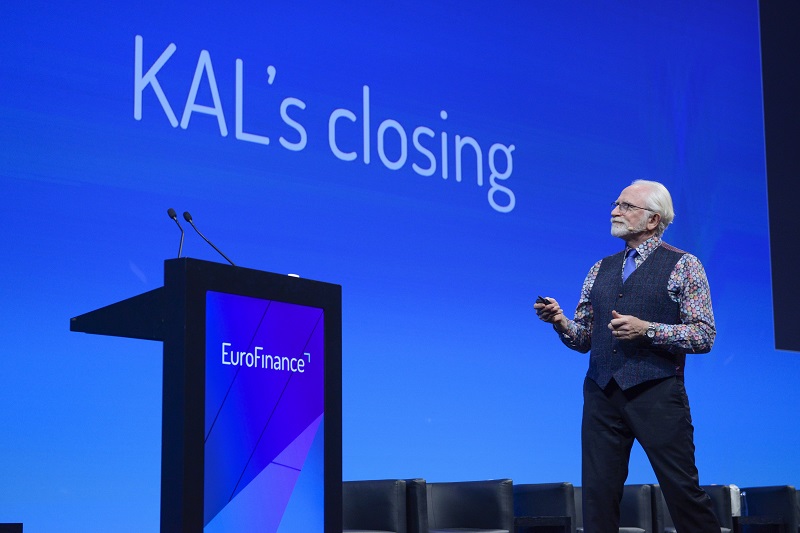
Kevin Kallaugher, better known as Kal, the veteran political cartoonist of The Economist
Trump card
Kevin Kallaugher, better known as Kal, the veteran political cartoonist of The Economist and the Baltimore Sun, was the conference’s final speaker and cited the famous observation of Italian Renaissance painter Annibale Carracci, who noted that “A good caricature is more true to life than reality itself”.
Kal, who also spoke at The Economist’s Global Treasury Leaders’ Summits, noted that there are fewer political cartoonists working today as newspapers steadily shrink and often their services were among the first to be dispensed with, yet there had never been a better time for cartoonists. And with only 14% of the world’s population living in regions where the press enjoys freedom it was incumbent on us to defend that liberty.
Even where press freedom is maintained, there are “a lot of cranky people out there”, said Kal, whose sensibilities are aroused when cartoons address issues such as religion. The Paris attack in 2015 on the staff of the satirical magazine Charlie Hebdo had underlined the risk. “Ideas don’t usually get you into trouble, it’s the way you portray them that could cause offence.”
Another challenge of producing a cartoon for a weekly publication such as The Economist was that for topics such as Brexit, the situation changed so rapidly that staying topical could prove impossible.
However, Kal did promise his audience “I’ll teach you all to draw Donald Trump”. EuroFinance 2019 concluded with delegates equipped with a pen and drawing pad following his onscreen lines and swirls, to depart with their own personal cartoon of the US’s 45th president.
